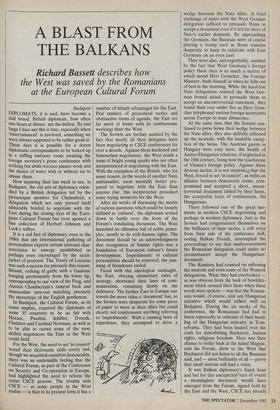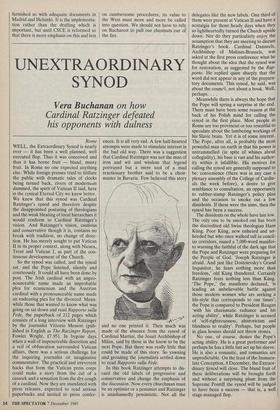A BLAST FROM THE BALKANS
Richard Bassett describes how the West was saved by the Romanians at the European Cultural Forum
Budapest DIPLOMATS, it is said, have become a dull breed. British diplomats, how often one hears at dinner, are the dullest. By and large I dare say this is true, especially when `entertainment' is involved, something we were always supposed to be rather good at. These days it is possible for a dozen diplomatic correspondents to be locked up in a stifling embassy room awaiting the foreign secretary's press conference with nothing but dritte roccoco plaster work and the choice of water with or without ice to amuse them.
How inspiring then last week to see, in Budapest, the old arts of diplomacy rekin- dled by a British delegation led by the picturesque member for Chelmsford, a delegation which not only proved itself admirably briefed to negotiate with the East during the closing days of the Euro- pean Cultural Forum but even sported a fine collection of Herbert Johnson and Lock's trilbys.
It is a sad fact of diplomacy even in the 1980s that any international gathering of personalities expects certain national char- acteristics to emerge uninhibited or perhaps even encouraged by the strait- jacket of protocol. The Treaty of Locarno was such a success for precisely this reason; Briand, reeking of garlic with a Gauloise hanging permanently from his lower lip, corresponding to our view of the Frog, and Austen Chamberlain's ramrod back and immaculate turn-out matching precisely the stereotype of the English gentleman.
In Budapest, the Cultural Forum, as its name implies, required the diplomats of some 35 countries to be au fait with Horace, Pasolini, Schiller, Dvorak, Chekhov and Cardinal Newman, as well as to be able to outwit some of the most skilled negotiators the East or the West could field.
For the West, the need to act 'in concert' tested their diplomatic skills sorely and, though we acquitted ourselves honourably, there was an undeniable feeling that the Cultural Forum, as part of the Conference on Security and Co-operation in Europe, had highlighted the need to reform the entire CSCE process. The trouble with CSCE — as some people in the West realise — is that in its present form it has a number of inbuilt advantages for the East. Past masters of procedural tactics and obstructive items of agenda, the East are far more at home with its cumbersome workings than the West.
The Soviets are further assisted by the fact that nearly all their delegates have been negotiating at CSCE conferences for over a decade. Against these hardened and humourless negotiators, the West sends a team of bright young sparks who are often inexperienced at negotiating with the East. With the exception of the British, who for some reason, in the words of another Nato ambassador, seem mentally better pre- pared to negotiate with the East than anyone else, this inexperience provoked some trying moments for the West.
After six weeks of discussing the merits of various questions which could be loosely defined as 'cultural', the diplomats settled down to battle over the form of the Forum's concluding document. The West launched an offensive full of noble princi- ples, mostly to do with human rights. The document should be an acknowledgment that recognition of human rights was a foundation of European culture's future development. 'Impediments' to cultural personalities should be removed, the jam- ming of broadcasts ended.
Faced with this ideological onslaught, the East, obeying elementary rules of strategy, shortened their lines of com- munication, remaining firmly on the defensive. The further East in Europe one travels the more value a 'document' has, so the Soviets were desperate for some piece of paper to wave at their allies but could clearly not countenance anything referring to 'impediments'. With a cunning born of experience, they attempted to drive a wedge between the Nato allies. A brief exchange of notes with the West German delegation sufficed to persuade Bonn to accept a document even if it fell far short of Nato's earlier demands. By approaching the Germans, the Russians were of course playing a trump card as Bonn remains desperate to keep its relations with East Germany on an even keel.
They were also, and regrettably, assisted by the fact that West Germany's foreign policy these days is so much a matter of which mood Herr Genscher, the Foreign Minister, finds himself in when he falls out of bed in the morning. While the hard-line Nato delegations resisted the West Ger- man frontal attack to persuade them to accept an uncontroversial statement, they found their rear under fire as Herr Gens- cher telephoned various foreign secretaries across Europe to issue demarches.
At the same time that the Soviets con- tinued to press home their wedge between the Nato allies, they also skilfully softened up the neutrals, with the laudable excep- tion of the Swiss. The Austrian guests in Hungary were easy meat, the health of Austro-Hungarian relations, if neglected in the 19th century, being now the touchstone of Vienna's foreign policy. Against these devious tactics, it is not surprising that the West, forced to act `in concert', as befits an alliance between democratic states, com- promised and accepted a short, uncon- troversial document tabled by their hosts, the acceptable faces of communism, the Hungarians.
There followed one of the great mo- ments in modern CSCE negotiating and perhaps in modern diplomacy. Just as the Soviets had congratulated themselves on the brilliance of their tactics, a soft voice from their side of the conference hall, oozing Balkan French, interrupted the proceedings to say that malheureusement the Romanian delegation could under no circumstances accept the Hungarians' document.
The Russians had counted on softening the neutrals and even some of the Western delegations. What they had overlooked as was obvious from the look of bewilder- ment which crossed their faces when these words were spoken was that the Roman- ians would, of course, sink any Hungarian initiative which would reflect well on Budapest. During the six weeks of the conference, the Romanians had had to listen repeatedly to criticism of their hand- ling of the Hungarian minority in Tran- sylvania. They had been hauled over the coals for demolishing Bucharest, human rights, religious freedom. Here was their chance to strike back at the hated Magyar, ruin his Forum, show to the West that Bucharest did not listen to all the Russians said, and — most brilliantly of all — prove that small nations still had a voice.
It was Balkan diplomacy's finest hour and but for this unexpected turn of events a meaningless document would have emerged from the Forum, signed both by the East and the West. CSCE has already furnished us with adequate documents in Madrid and Helsinki. It is the implementa- tion rather than the drafting which is important, but until CSCE is reformed so that there is more emphasis on this and less on cumbersome procedures, its value to the West must more and more be called into question. We should not have to rely on Bucharest to pull our chestnuts out of the fire.



































































 Previous page
Previous page